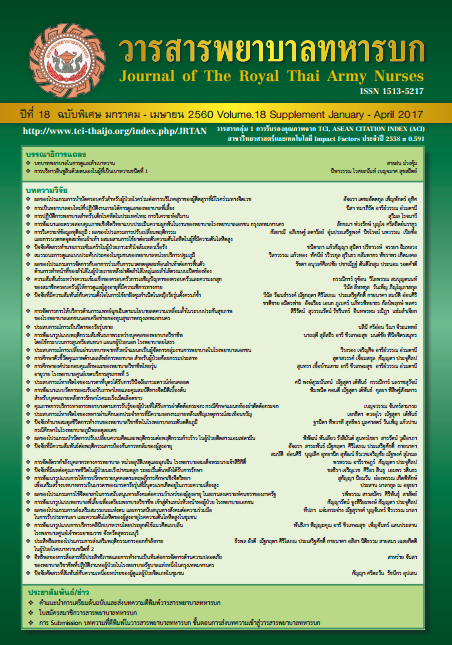ผลของโปรแกรมการบำบัดครอบครัวสำหรับผู้ป่วยโรคร่วมต่อการบริโภคสุราของผู้ติดสุราที่มีโรคร่วมทางจิตเวช
Keywords:
การบำบัดครอบครัว, การบริโภคสุรา, ผู้ติดสุราที่มีโรคร่วมทางจิตเวช, Family intervention, Alcohol consumption, Alcohol dependence clients with psychiatric comorbidityAbstract
การวิจัยกึ่งทดลองนี้มีวัตถุประสงค์เพื่อศึกษาผลของโปรแกรมการบำบัดครอบครัวสำหรับผู้ป่วยโรคร่วมต่อการบริโภคสุราของผู้ติดสุราที่มีโรคร่วมทางจิตเวช กลุ่มตัวอย่างเป็นครอบครัวของผู้ติดสุราที่มีโรคร่วมทางจิตเวชจำนวน 40 ครอบครัว ซึ่งมีคุณสมบัติตามเกณฑ์ที่กำหนดมารับบริการแบบผู้ป่วยนอก แผนกการพยาบาลจิตเวชและประสาทวิทยากลุ่มทดลองและกลุ่ม ควบคุมกลุ่มละ 20 ครอบครัว กลุ่มทดลองได้รับโปรแกรมการบำบัดครอบครัว ซึ่งผู้วิจัยประยุกต์มาจากการศึกษาของ Mueser and Fox (2002) ส่วนกลุ่มควบคุมได้รับการพยาบาลตามปกติ เครื่องมือที่ใช้ใช้ในการวิจัย ได้แก่ 1) โปรแกรมการบำบัด ครอบครัว 2) แบบสอบถามข้อมูลส่วนบุคคล 3) แบบประเมินปัญหาการบริโภคสุรา 4) แบบบันทึกการบริโภคสุรา (Timeline Followback) และ 5) แบบประเมินสัมพันธภาพในครอบครัว เครื่องมือทุกชุดผ่านการตรวจสอบความตรงเชิงเนื้อหา แบบบันทึกการบริโภคสุราตรวจสอบความเที่ยงโดยวิธีทดสอบซ้ำพบค่าสัมประสิทธิ์สหสัมพันธ์ของเพียร์สันเท่ากับ .97 และแบบประเมินสัมพันธภาพในครอบครัวตรวจสอบค่าความเที่ยงพบค่าสัมประสิทธิ์อัลฟาของครอนบาคเท่ากับ .87 วิเคราะห์ข้อมูลโดยใช้สถิติทีผลการวิจัยพบว่า ผู้ติดสุราที่มีโรคร่วมทางจิตเวชมีปริมาณการบริโภคสุราร้อยละของจำนวนวันดื่มหนักหลังได้รับโปรแกรมการบำบัดครอบครัวลดลงและมีร้อยละของจำนวนวันหยุดดื่มหลังได้รับโปรแกรมการบำบัดครอบครัวมากกว่ากลุ่มผู้ติดสุราที่มีโรคร่วมทางจิตเวชที่ได้รับการพยาบาลตามปกติอย่างมีนัยสำคัญทางสถิติที่ระดับ .05 ข้อเสนอแนะที่ได้จากการศึกษาคือควรมีแนวทางการบำบัดผู้ติดสุราที่มีโรคร่วมทางจิตเวชโดยให้ครอบครัวเข้ามามีบทบาทในการดูแลเพื่อส่งเสริมให้ผู้ป่วยลดการบริโภคสุราได้อย่างมีประสิทธิภาพ
The Effect Of Family Intervention For Dual Disorders Program On Alcohol Consumption Among Alcohol Dependence Clients With Psychiatric Comorbidity
Abstract
This study is quasi-experimentalpretest-posttest control group research design. The objectives were to comparealcohol consumption of alcohol dependence clients with psychiatric comorbidity. The Sample consisted of 40 families’ alcohol dependence clients with psychiatric comorbidity at Psychiatry and Neurology outpatient department in Phramongkutklao Hospital and randomly assigned to either experimental or control group, 20 subjects in each group. Research comprised of: 1) Family intervention 2) Demographic questionnaire 3) the AUDIT scale 4) Timeline followback and 5) Family relationship scale. All instruments were verified for content validity. The reliability of 4th instrument was reported by Pearson Correlation as of .97 and the 5th instruments had Cronbach’s Alpha Coefficient reliability of .84. Descriptive statistics and t-test were used in Data analysis. The results showed that Alcohol consumption and Percent of drinking days in alcohol dependence clients with psychiatric comorbidity who received family intervention for dual disorders program measured after the end of intervention was significantly lower and Percent of abstinence drinking days in alcohol dependence clients with psychiatric comorbidity who received family intervention for dual disorders program measured after the end of intervention was significantly higher than those who received regular nursing care (p <.05). The researcher recommends nurses support role of family to decrease alcohol consumption in alcohol dependence clients with psychiatric comorbidity
Downloads
Downloads
How to Cite
Issue
Section
License
บทความหรือข้อคิดเห็นใดใดที่ปรากฏในวารสารพยาบาลทหารบกเป็นวรรณกรรมของผู้เขียน ซึ่งบรรณาธิการหรือสมาคมพยาบาลทหารบก ไม่จำเป็นต้องเห็นด้วย
บทความที่ได้รับการตีพิมพ์เป็นลิขสิทธิ์ของวารสารพยาบาลทหารบก
The ideas and opinions expressed in the Journal of The Royal Thai Army Nurses are those of the authors and not necessarily those
of the editor or Royal Thai Army Nurses Association.






